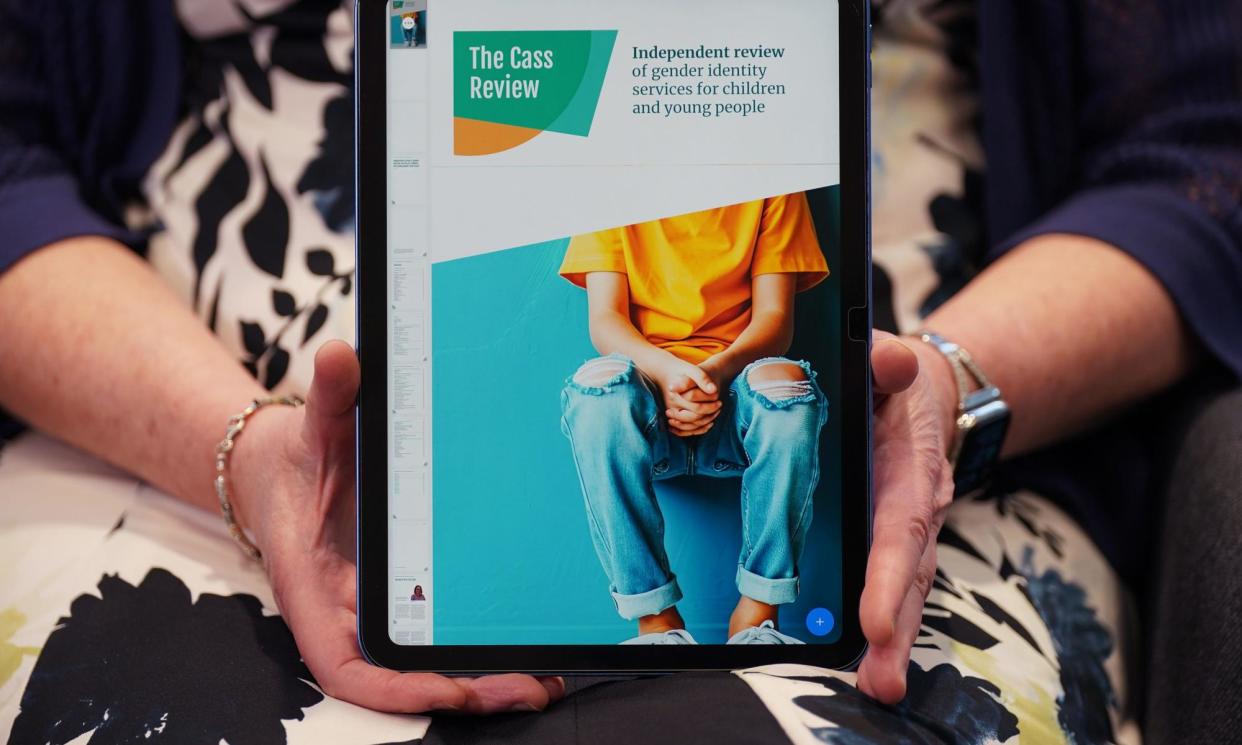Hilary Cass’s report and the trans rights debate

In our view, Freddy McConnell’s opinion piece (Hilary Cass’s proposals are mostly common sense. She must reject anti-trans bias with the same clarity, 11 April) implies that support for the Clinical Advisory Network on Sex and Gender (CAN-SG) fundamentally undermines trans people’s identities and rights, and that clinicians who question the innate model of gender identity – as do CAN-SG members – do not have the best interests of patients at heart and are “denying the existence” of trans people.
We reject these claims. In fact, it is suppression of research and debate in this area that undermines proper understanding of gender identity and the right to effective, safe medical treatment.
The Cass report says: “There is broad agreement that gender incongruence is a result of a complex interplay between biological, psychological and social factors”, and this varies over time and between individuals. This is a fundamentally different model to that of an innate gender identity that must be affirmed. Developing better models to understand aspects of human distress is medicine and science as normal, and is not denying anyone’s existence or rights.
Many clinicians have been intimidated into silence due to this kind of toxic, hyperbolic response. The CAN-SG conference about avoiding harm in gender medicine went ahead on 23 March in the face of cancellation attempts and masked protesters with smoke bombs trying to force entry.
Despite the aggression, courageous clinicians, including CAN-SG members, have for some time raised concerns about risks, and challenged the inadequate assessment, low-quality research and poor data collection that the Cass report now highlights. Victoria Atkins, the secretary of state for health and social care, said in parliament that she expected “medical professionals will act in accordance with these recommendations”, and this was echoed by Wes Streeting, her Labour shadow. CAN-SG members call on colleagues to follow our lead.
Dr Stella Kingett
Dr Louise Irvine
Co-chairs, CAN-SG
• Freddy McConnell hits the nail on the head. Hilary Cass has delivered a paediatrician’s evaluation of clinical care for trans children and young people; her report is balanced and full of common sense. But in failing to acknowledge the reality of childhood gender dysphoria explicitly, she has made it too easy for transphobes to repurpose it as evidence that childhood gender dysphoria is an ideological invention.
I am nearly 60 and I was a gender-dysphoric child. There was no social transition in the early 1970s; I spent my childhood being bullied as a sissy, struggling desperately – and failing – to fit in. There was no internet; for all I knew, I was the only child in the world who was like this. Eventually, in my teens, I learned how to “pass” as a “normal” male. The influencers were not vloggers but society, which required me to squeeze into a mould I did not fit or suffer its approbation. Self-acceptance came only after decades of mental anguish.
I know what it feels like to live in a world that denies the reality of childhood gender dysphoria. It would be a tremendous failure if a review of clinical care for young people was allowed to be hijacked in the service of hate.
Karen Smith
Sheffield
• As the mother of a transgender daughter who has been waiting for her first appointment following four years (and counting) on the NHS waiting list, I write to thank Freddy McConnell for his article. To hear the voice of a trans person through the cacophony is sadly a rarity.
Amnesty International UK and Liberty have noted that the Cass review is already being weaponised by anti-trans groups, despite the review itself clearly noting how damaging the toxicity of debates can be for transgender young people, their families and friends.
In this context, I would ask that gender-critical politicians and activists consider the impact of their words as families like ours attempt to process the very real implications of the review on our lives. And respectfully remind them that some women mustn’t claim to speak for all women.
Name and address supplied
• I am concerned that in your editorial (11 April) you seem to use terms such as “gender dysphoria”, “trans identity” and “transgender” as though they are the same. The Cass report is not addressing “trans children” but children expressing a symptom where their biological sex and expressed gender identity are out of alignment.
I was involved in the design, data collection and analysis of what Hannah Barnes described in her book Time to Think as the only proper audit of the Gender Identity Development Service. We found that approximately 20% of the first 124 children referred to the service had some kind of strong non-aligned identity, a figure also found by Emerita Professor Susan Bradley, the psychiatrist who set up the first clinic in Canada for such children, during her very long experience in this field. Of that 20%, it cannot be assumed that their chosen trajectory will be one of adopting a full trans identity in adulthood. Let us all be very careful in the language that we use.
David Freedman
London

 Yahoo News
Yahoo News 
